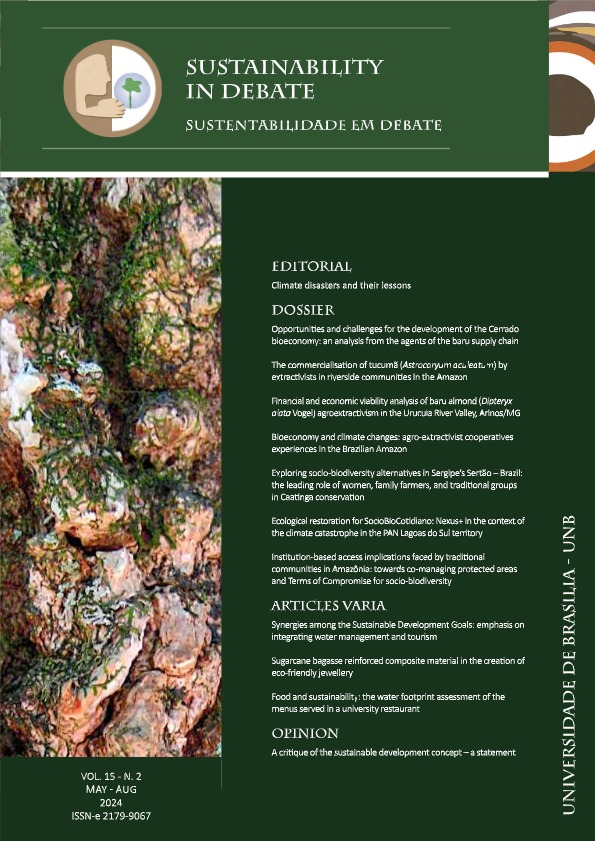Biocultural diversity and bioeconomy(ies): dialogue between concepts and dimensions for a sustainable future
Downloads
References
BANIWA, B.; APURINÃ, F.; VICENTE, I.; FELTRAN-BARBIERI, R. Bioeconomia indígena: saberes ancestrais e tecnologias sociais. Uma Concertação pela Amazônia (Org.). São Paulo: Arapyaú. Cadernos de Concertação, v. 3. 2024.
BRONDIZIO, E. S.; SETTELE, J.; DÍAZ, S.; NGO, H. T. Global assessment report on biodiversity and ecosystem services of the Intergovernmental Science-Policy Platform on Biodiversity and Ecosystem Services. IPBES secretariat, Bonn, Germany. 1148 pages. 2019.https://doi.org/10.5281/zenodo.3831673
CRUZ, F. T. Governança de sistemas alimentares para a soberania e segurança alimentar e nutricional. In.: PREISS, P.; SCHNEIDER, S. (Org.). Sistemas alimentares no século 21: debates contemporâneos. Porto Alegre: Editora da UFRGS, p. 199-218, 2020.
DASGUPTA, P. The Economics of Biodiversity: the dasgupta review. London: HM Treasury. 2021.
DIEGUES, A. C. S. Sociobiodiversidade. In: FERRARO JUNIOR, I. A. (Org.). Encontros e Caminhos: Fundação de Educadoras(es) Ambientais e Coletivos Educadores. Brasília: Ministério do Meio Ambiente, p. 305-312, 2005.
DIETZ, T.; BÖRNER, J.; FÖRSTER, J. J.; VON BRAUN, J. Governance of the bioeconomy: a global comparative study of national bioeconomy strategies. Sustainability, v. 10, p. 3190, 2018.
DINIZ, J. D. A. S.; CERDAN, C. Produtos da sociobiodiversidade e cadeias curtas: aproximação socioespacial para uma valorização cultural e econômica. In: GAZOLLA, M.; SCHNEIDER, S. (Org.). Cadeias curtas e redes agroalimentares alternativas: negócios e mercados da agricultura familiar. Porto Alegre, Editora da UFRGS, 2017, p. 259-280.
FAO. Agricultural Biodiversity, Multifunctional Character of Agriculture and Land Conference. Background Paper 1, Maastricht. 1999.
Disponível em: https:// www.fao.org/3/x2775e/X2775E02.htm#P41_7891
GOODMAN, D.; DUPUIS, M. E.; GOODMAN, M. K. Alternative food networks: knowledge, practice, and politics. Abingdon: Routledge. 2012.
IPCC. Sections. In: Climate Change 2023: synthesis report. Contribution of Working Groups I, II and III to the Sixth Assessment Report of the Intergovernmental Panel on Climate Change [Core Writing Team, H. Lee and J. Romero (eds.)]. IPCC. Geneva, Switzerland, p. 35-115, 2023. DOI: 10.59327/IPCC/AR6-9789291691647
MALHEIRO, B.; PORTO-GONÇALVES, C. W.; MICHELOTTI, F. Horizontes amazônicos: para pensar o Brasil e o mundo. São Paulo: Fundação Rosa Luxemburgo/Expressão Popular. 2021.
MAZZETTO SILVA, C. E. Modo de apropriação da natureza e territorialidade camponesa: revisitando e ressignificando o conceito de campesinato. Geografias, Belo Horizonte, v. 3, n. 1, jan-jun, p. 46-63, 2007.
NOBRE, I.; NOBRE, C. A. The Amazonian Third Way Initiative: the role of technology to unveil the potential of a novel tropical Biodiversity-Based Economy. In: LOURES, L. (Ed.) Land use: assessing the past, envisioning the future. IntechOpen. 2018. DOI:10.5772/intechopen.80413.
REDE PENSSAN. II Vigisan. Inquérito Nacional sobre Insegurança Alimentar no Contexto da Pandemia da Covid-19 no Brasil. 2022. Disponível em: http://olheparaafome.com.br/VIGISAN_Inseguranca_alimentar.pdf.
SCORZA, F. A.; BELTRAMIM, L.; BOMBARDI, L. M. Pesticide exposure and human health: toxic legacy. Clinics, v. 78, p. 100249, 2023.
SILVA, F. D. S. E.; CARVALHEIRO, L. G.; MERTENS, F. A valoração econômica da polinização agrícola como forma de orientar estratégias de proteção aos polinizadores. Revista Panorâmica, v. 2, Edição Especial, p. 159-182, 2021.
WISKERKE, J. S. C. On places lost and places regained: reflections on the alternative food geography and sustainable regional development. International Planning Studies, n. 14, v. 4, mar., p. 369-387, 2009.
Downloads
Published
How to Cite
Issue
Section
License
Copyright (c) 2024 Sustainability in Debate

This work is licensed under a Creative Commons Attribution-NonCommercial-NoDerivatives 4.0 International License.
SUSTAINABILITY IN DEBATE – Copyright Statement
The submission of original scientific work(s) by the authors, as the copyright holders of the text(s) sent to the journal, under the terms of Law 9.610/98, implies in the concession of copyrights of printed and/or digital publication to the Sustainability in Debate Journal of the article(s) approved for publication purposes, in a single issue of the journal. Furthermore, approved scientific work(s) will be released without any charge, or any kind of copyright reimbursement, through the journal’s website, for reading, printing and/or downloading of the text file, from the date of acceptance for publication purposes. Therefore, the authors, when submitting the article (s) to the journal, and gratuitous assignment of copyrights related to the submitted scientific work, are fully aware that they will not be remunerated for the publication of the article(s) in the journal.
The Sustainability in Debate Journal is licensed under Creative Commons License – Non-Commercial-No-Derivation Attribution (Derivative Work Ban) 3.0 Brazil, aiming at dissemination of scientific knowledge, as indicated on the journal's website, which allows the text to be shared, and be recognized in regards to its authorship and original publication in this journal.
Authors are allowed to sign additional contracts separately, for non-exclusive distribution of the works published in the Sustainability in Debate Journal (for example, in a book chapter), provided that it is expressed the texts were originally published in this journal. Authors are allowed and encouraged to publish and distribute their text online, following publication in Sustainability in Debate (e.g. in institutional repositories or their personal pages). The authors expressly agree to the terms of this Copyright Statement, which will be applied following the submission and publishing by this journal.





